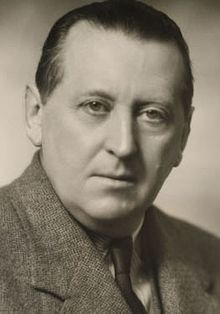York Bowen
Edwin York Bowen (born February 22, 1884 in London , † November 23, 1961 there ) was an English pianist and composer .
Life
Bowen was the youngest son of the owner of the Bowen & McKechnie whiskey distillery in Crouch Hill / London. He took piano lessons as a child from his mother, who recognized his talent and sent him to the North Metropolitan College of Music . He made rapid progress and performed at the age of eight with a piano concerto by Jan Ladislav Dussek .
He continued his education with Alfred Izard at the Blackheath Conservatoire and at the age of fourteen came to the Royal Academy of Music , where he studied piano with Tobias Matthay and composition with Frederick Corder until 1905 . He also trained as an organist, violist and horn player here.
In 1903 Bowen played the world premiere of his first piano concerto at the Proms under the direction of Henry Wood . Camille Saint-Saëns , who heard the performance, described him as the most important among young English composers. Under the direction of Hans Richter Bowen a. a. his third piano concerto, and with Fritz Kreisler he performed his suite for violin and piano. The work was later played by Joseph Szigeti and Efrem Zimbalist .
In 1907 he became a fellow and in 1909 a professor at the Royal Academy of Music. In 1912 he married the singer Sylvia Dalton . During the First World War Bowen was a horn player with the Scottish Guard. After the war, he wrote his 24 preludes for piano, which are considered his most important compositions. He composed works for instrumentalists such as Dennis Brain , Carl Dolmetsch , Léon Goossens , Beatrice Harrison , Pauline Juler and Gareth Morris and made the first record of Beethoven 's fourth piano concerto . He performed as a piano duo with Harry Isaacs .
Bowen composed four piano concertos, three symphonies as well as violin and viola concertos. In addition to the aforementioned 24 preludes, he composed for the piano a. a. six sonatas, as well as suites, ballads, romances and other small pieces; he also wrote two piano schools. The Piano Sonata No. 6 from 1961 is probably his last work, although some manuscripts still exist.
Discography (selection)
- 2002: Symphony No. 2 in E minor , RNCMSO, conducted by Douglas Bostock , Classico
- 2004: Viola Concerto op.25 Lawrence Power, BBC Scottish Symphony Orchestra, Martyn
- 2010: The piano sonatas , played by Chloë Hanslip and Danny Driver , Hyperion
- 2008: piano concertos 3 + 4 . Danny Driver, BBC Scottish Symphony Orchestra.
Web links
- York Bowen sheet music and audio files in the International Music Score Library Project
- Literature by and about York Bowen in the catalog of the German National Library
- York Bowen Home Page with biography, discography and catalog raisonné
swell
| personal data | |
|---|---|
| SURNAME | Bowen, York |
| ALTERNATIVE NAMES | Bowen, Edwin York (full name) |
| BRIEF DESCRIPTION | English pianist and composer |
| DATE OF BIRTH | February 22, 1884 |
| PLACE OF BIRTH | London |
| DATE OF DEATH | November 23, 1961 |
| Place of death | London |
